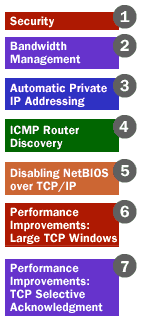TCP/IP Features

- Security: TCP/IP allows enhanced data and connection security by supporting a number of IETF-proposed standards for data encryption, authentication, and filtering. The Windows 2000 implementation of TCP/IP supports Internet Protocol Security (IPSec) and TCP/IP filtering for packet-level authentication and data encryption, as well as for filtering data. IPSec is new in Windows 2000 and provides end-to-end data authentication and encryption, which has never before been available in Windows network operating systems.
- Bandwidth Management: Time-sensitive IP traffic streams such as streaming multimedia require connection protocols that provide bandwidth reservation within a network. TCP/IP supports bandwidth reservation by using Quality of Service (QoS) mechanisms, which allow IP traffic to be prioritized. QoS is especially important when an organization requires "real-time" delivery of TCP/IP packets, as would be required with various IP Telephony applications
- Automatic Private IP Addressing: Automatic Private IP Addressing (APIPA) automates TCP/IP address configuration for hosts on a single-subnet network that has no DHCP server. APIPA eliminates IP address configuration for simple networks not connected to the Internet. The IP addresses for APIPA are allocated from 169.254.0.0/16, which is reserved by the Internet Assigned Numbers Authority (IANA) and represents a private network address class.
- ICMP Router Discovery: Windows 2000-based computers running RRAS support Internet Control Message Protocol (ICMP) router discovery (RFC 1256). This allows a host to discover the router automatically, although a default gateway is not configured for the host. ICMP router discovery is disabled by default on TCP/IP for Windows 2000 hosts, and is managed by using DHCP.
- Disabling NetBIOS over TCP/IP: Windows 2000 allows you to disable network basic input/output system (NetBIOS) over TCP/IP (NetBT) for computers that use only DNS name registration and resolution. These computers can browse resources only on those computers that:
- Have NetBT disabled.
- Use Client for Microsoft Networks, and File and Print Sharing for Microsoft Networks components.
- Large TCP Windows:
- TCP Selective Acknowledgement:
Protocol Standards
Protocols are formal rules of behavior. In international relations, protocols minimize the problems caused by cultural differences when various
nations work together. By agreeing to a common set of rules that are widely known and independent of any nation's customs, diplomatic protocols minimize misunderstandings.
Similarly, when computers communicate, it is necessary to define a set of rules to govern their communications.
In data communications, these sets of rules are also called protocols. In homogeneous networks, a single computer vendor specifies a set of communications rules designed to use the strengths of the vendor’s operating system and hardware architecture. But homogeneous networks are like the culture of a single country, only the natives are truly at home in it. TCP/IP creates a heterogeneous network with open protocols that are independent of operating system and architectural differences.
TCP/IP protocols are available to everyone and are developed and changed by consensus, not by the fiat of one manufacturer. Everyone is free to develop products to meet these open protocol specifications.
The open nature of TCP/IP protocols requires an open standards development process and publicly available standards documents. Internet standards are developed by the Internet Engineering Task Force (IETF) in open, public meetings. The protocols developed in this process are published as Requests for Comments (RFCs).* As the title “Request for Comments” implies, the style and content of these documents are much less rigid than in most standards documents. RFCs contain a wide range of interesting and useful information, and are not limited to the formal specification of data communications protocols. There are three basic types of RFCs: standards (STD), best current practices (BCP), and informational (FYI).
The open nature of TCP/IP protocols requires an open standards development process and publicly available standards documents. Internet standards are developed by the Internet Engineering Task Force (IETF) in open, public meetings. The protocols developed in this process are published as Requests for Comments (RFCs).* As the title “Request for Comments” implies, the style and content of these documents are much less rigid than in most standards documents. RFCs contain a wide range of interesting and useful information, and are not limited to the formal specification of data communications protocols. There are three basic types of RFCs: standards (STD), best current practices (BCP), and informational (FYI).